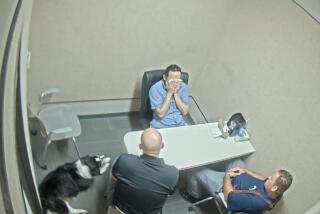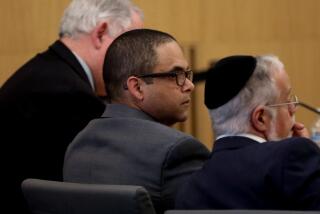Paralyzed Police Shooting Victim Tries to Tell Story--4 Years Later
- Share via
For more than four years, Francis (Francie) Dotts has been confined to a hospital bed, his paralyzed limbs curled into his torso and his mind severely damaged by a bullet that ripped through his brain.
The reputed one-time drug dealer, now 59, occasionally speaks of his youth in Chicago, according to his sister, Gloria Nelson, but he never seemed to recall Aug. 3, 1983, the day he was shot by Inglewood policeman Edmund Woods during a drug raid.
So Nelson and family lawyer Robert Tobias were stunned last weekend when, they said, Dotts remembered the shooting two weeks into the trial of the family’s lawsuit against the Inglewood Police Department.
But Tobias failed last week in a dramatic 11th-hour attempt to have Dotts testify in the trial, which has become an exhaustive review of a policeman’s split-second decision to use deadly force. Closing arguments in the Torrance Superior Court case are expected sometime this week.
The suit was filed in 1984 by Nelson on behalf of her brother, charging that the Inglewood and Hawthorne police departments were negligent in Dotts’ shooting.
The suit initially demanded $100 million in damages but the request was later revised to $6.5 million. (Hawthorne was removed from the case last month when its insurance company agreed to pay a $50,000 settlement.)
The incident under scrutiny began with a Hawthorne police investigation that led detectives to Dotts’ apartment in the neighboring city of Inglewood. Woods was one of several Inglewood detectives who joined in a search for “loads,” a combination of drugs often used as a replacement for heroin.
Woods forced the door with a battering ram and chased Dotts to a bedroom. Woods testified that he was worried that Dotts would dispose of drugs.
When he came to the bedroom doorway, Woods said, he saw Dotts sitting on the edge of a bed, bent over at the waist, moving his hands quickly between the mattress and box spring. The policeman said he screamed, “Freeze, police!” several times.
When Dotts looked up suddenly--apparently ready to fire a gun of his own, Woods testified--the officer fired a single shot from his .357 Magnum revolver. There was no gun in the bed.
Throughout four years of trial preparations, both sides assumed that Dotts would not be able to tell his side of the story--until Monday, when Tobias told Superior Court Judge Douglas McKee that Dotts remembered the shooting and was prepared to testify.
Two blue-uniformed attendants wheeled Dotts into the Torrance courtroom on a gurney. Dotts, his head turned to one side, wheezed and coughed loudly. A nurse said that only nylon restraining straps prevented him from being thrown to the floor when he suffered convulsions.
Judge McKee ruled that Dotts would have to demonstrate his ability to testify lucidly before the judge would allow him to answer questions about the shooting.
With the jury absent, court clerk Kerry Formiller twice stood over Dotts and asked him if he would testify truthfully.
No Answer
A circle of lawyers and court personnel around the gurney strained to hear Dotts’ answer. There was none. The gaunt face protruding from white sheets did not not move, and the eyes focused somewhere beyond Formiller.
Then Tobias asked: “Do you know what it means to tell the truth?”
Dotts responded: “A lie,” followed by a string of unintelligible words. After a short break, Tobias repeated the question and Dotts answered, “The opposite of a lie.”
Then Timothy Walker, the attorney for the Inglewood Police Department, asked Dotts why he was in court and Dotts said he was appearing “. . . on some kind of warrant. . . . To tell the truth, I don’t know what I did.”
Dotts seemed oblivious as the two lawyers argued about his ability to testify. He remained impassive when McKee ruled that he was incompetent to testify about the shooting.
Tobias called the ruling “most damaging” because he said Dotts would have told jurors that he did not have a gun and that he never reached between the bed’s mattress and box spring in the critical moments leading up to the shooting.
Walker scoffed at what he described as a last-minute “desperation” attempt to have Dotts testify.
“I don’t doubt that (Dotts) might be able to respond to some suggestion placed in his mind,” Walker said after the hearing. “But I don’t believe for a moment, from what I have seen and what the doctors have said, that he would be able to testify rationally and intelligently about what occurred.”
Dotts was wheeled from the court after McKee’s ruling. He smiled weakly when his sister told him that he would not be able to testify, then was wheeled outside for the ride back to at High Desert Hospital in Lancaster.
With the exclusion of Dotts, jurors will be left with Woods’ testimony and a series of conflicting opinions from police experts about the shooting.
Should Have Waited
Tobias said his case will prove that Woods should have waited to see a weapon before firing his gun. “You don’t shoot a man who obeys what you tell him to do, when you say freeze and he freezes,” Tobias said.
The lawyer also has tried to prove that Woods created the deadly situation when he stepped into the doorway, instead of taking cover behind a wall. Woods limited his options by leaving himself unprotected, Tobias said.
Walker countered that Woods faced the danger of being shot first if he waited to see a weapon before firing.
“It was Officer Woods’ feeling that (Dotts) was looking for a gun between the mattress and box spring,” Walker said. “That he had found it and that he was sizing him up to shoot him.”
The case is as striking for what jurors will not hear as for what they will. They will not be told that a loaded rifle was found in a corner of the bedroom and that Dotts’ common-law wife was standing nearby. And they will not be told that the apartment was filled with drugs and drug paraphernalia.
Tobias said those facts would prejudice the jury and asked McKee to exclude them from the trial. The judge agreed, but also refused to allow testimony that there was no gun in the bed.
McKee said limiting the evidence on both sides will force jurors to judge Woods’ actions with essentially the same information that the policeman had more than four years ago, on the day that he shot Francis Dotts.
More to Read
Sign up for Essential California
The most important California stories and recommendations in your inbox every morning.
You may occasionally receive promotional content from the Los Angeles Times.











